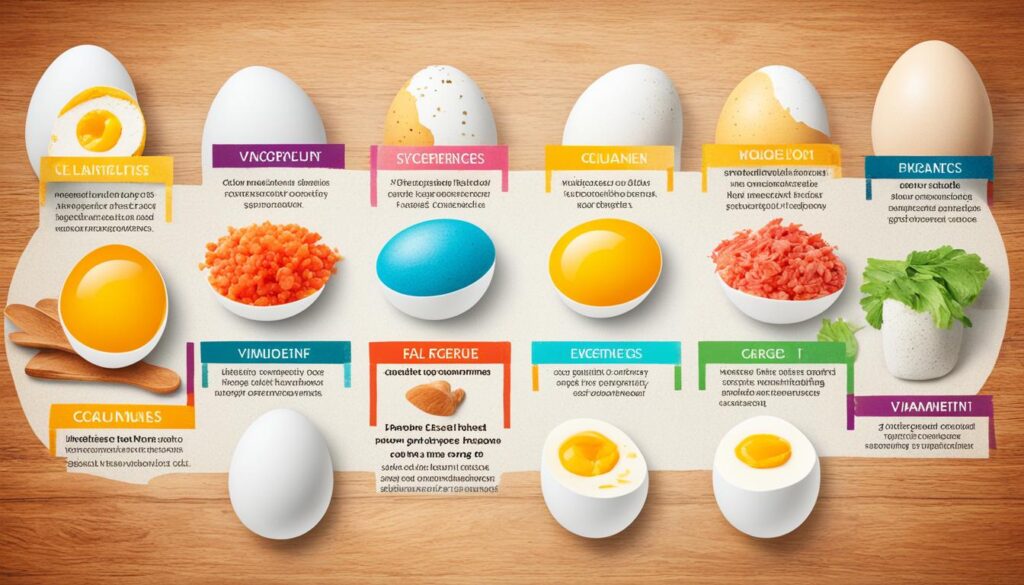#egg nutrition facts
Ever wondered why eggs are a key part of diets globally? They’re seen as a top source of healthy protein. Eggs are packed with nutrients that boost health. A single large egg has about 6 grams of protein and many vitamins and minerals.
Eggs are versatile, making them easy to include in many meals. From boiling to scrambling, they fit into any diet. Eggs are more than just food; they’re a key part of a balanced diet.
Let’s explore why eggs are great for your health and why they should be in your kitchen.

Key Takeaways
- Eggs provide a significant amount of protein, making them a healthy protein source.
- They contain essential vitamins and minerals critical for various bodily functions.
- Understanding egg nutrition facts can help in making informed dietary choices.
- The versatility of eggs allows for numerous preparation methods suited for any meal.
- Regular consumption of eggs can enhance overall health and well-being.
Understanding Egg Nutrition Facts
Eggs are a great source of nutrition, packed with essential nutrients for good health. They are full of proteins, fats, vitamins, and minerals. A large egg has about 70 calories, mostly from protein and fat. This makes eggs a top choice for a balanced diet.
Overview of Nutritional Composition
Eggs are a key part of a healthy diet because of their nutritional value. Here’s what you get in one large egg:
| Nutrient | Amount per Large Egg |
|---|---|
| Calories | 70 |
| Protein | 6g |
| Fat | 5g |
| Carbohydrates | 0.6g |
| Cholesterol | 186mg |
| Vitamins | A, D, E, B12 |
| Minerals | Iron, Zinc, Selenium |
Egg Serving Sizes and Their Impact
Knowing how much egg to eat is key to getting the most egg health benefits. Different amounts affect how much nutrition you get and your diet needs. Athletes or those who are active might need more protein for muscle repair and recovery. So, eating more eggs can be good for them.
Recommended egg servings vary by individual needs, but usually, one to two eggs per meal is enough. By choosing the right amount, you can make the most of egg nutrition.
Calories and Macros: Egg Calorie Content
Understanding the calorie value and macronutrient profile of different egg types is key for meal planning and dietary needs. Eggs are a top choice for protein and are versatile in cooking. Knowing the calorie content helps individuals reach their nutritional goals.
Caloric Value of Different Egg Types
There are slight calorie variations among egg types like organic, free-range, and conventional. A large egg usually has 60-80 calories. Here’s a table showing the calorie value for different egg types:
| Type of Egg | Approximate Calorie Value (per large egg) |
|---|---|
| Conventional | 70 calories |
| Organic | 70-80 calories |
| Free-Range | 65-75 calories |
Breaking Down Carbohydrates, Fats, and Proteins
Eggs offer essential nutrients for a balanced diet. A large egg has less than 1 gram of carbs, about 5 grams of fat, and around 6 grams of protein. About 3 grams of the fat is from healthy unsaturated fats. This makes eggs versatile in many meals.

The Nutrient Powerhouse: Vitamins in Eggs
Eggs are more than just a tasty breakfast choice. They are a great source of essential vitamins. These vitamins are key for good health. Eating eggs regularly can help with many body functions.
Essential Vitamins Found in Eggs
Here are the key vitamins in eggs:
- Vitamin A: Important for vision, immune function, and skin health.
- B Vitamins: Include B12 for nerve health, B2 for energy production, and folate for cellular functions.
- Vitamin D: Supporting bone health and calcium absorption.
- Vitamin E: Acts as an antioxidant, helping to protect cells from damage.
The Role of Vitamins for Health
Eggs have essential vitamins that are good for health. The fat in eggs helps your body use vitamins better. A diet with eggs can boost your immune system, increase energy, and help cells grow healthy.
Understanding the role of vitamins in eggs shows how important they are for a balanced diet. They help you live a healthy life.

| Vitamin | Primary Benefits | Food Sources |
|---|---|---|
| Vitamin A | Vision, immune function | Eggs, liver, carrots |
| B12 | Nerve health, energy production | Eggs, fish, dairy |
| B2 | Metabolism, cellular growth | Eggs, nuts, leafy greens |
| Folate | Cellular functions | Eggs, legumes, oranges |
| Vitamin D | Bone health | Eggs, fatty fish, fortified foods |
| Vitamin E | Antioxidant, skin health | Eggs, nuts, seeds |
Mineral Content in Eggs: A Key Benefit
Eggs are known for their nutrient profile, especially the minerals they offer. These minerals are key for staying healthy and full of energy.
Important Minerals and Their Functions
Eggs are packed with important minerals that help our bodies work right:
- Iron: Iron is key for carrying oxygen in the blood. It makes sure muscles and organs get enough oxygen.
- Zinc: Zinc is crucial for fighting off sickness, healing wounds, and helping with growth and development.
- Phosphorus: Phosphorus is vital for keeping bones strong. It helps make bones and teeth.
- Selenium: Selenium works as an antioxidant. It protects cells from harm and is key for metabolism.
How Minerals Support Overall Health
The health benefits of minerals in eggs go beyond single tasks. They work together to support:
- Bones: Phosphorus and calcium together make bones strong.
- Immune System: Zinc and selenium boost immune responses, lowering the chance of getting sick.
- Energy Production: Iron helps make energy by carrying oxygen.
- Antioxidant Defense: Selenium fights oxidative stress, which can cause inflammation.
The Health Benefits of Eating Eggs
Eggs are packed with nutrients that boost your health. They help with muscle growth and eye health. This makes them a great addition to a healthy diet.
Impact on Muscle Growth and Maintenance
Eggs are full of high-quality protein, which is key for building muscles. They also have amino acids that help muscles repair and grow. This makes them a favorite among athletes and those who work out.
The benefits of eggs go beyond just muscle growth. They also have vitamins and minerals that help with overall health and recovery.
Eggs and Eye Health: The Connection
Eggs are loaded with antioxidants like lutein and zeaxanthin. These are good for your eyes. They lower the risk of eye problems that come with age.
By eating eggs regularly, you can keep your eyes healthy. This protects them from damage caused by too much sunlight. Adding eggs to your meals is a tasty way to support your eye health.
Egg Dietary Information: What You Need to Know
Knowing how to eat eggs is key for a balanced diet. Experts say you can have up to one egg a day. This depends on your diet and health.
Daily Consumption Recommendations
Eggs are packed with protein and nutrients, but eat them in moderation. If you’re watching your cholesterol, think about how many eggs you eat. Here are some tips:
- Up to one egg per day for most adults.
- Include eggs in a varied diet for balanced nutrition.
- Talk to a doctor if you have dietary concerns.
Egg Preparation Methods and Nutritional Retention
How you cook eggs affects their nutrition. Different ways of cooking change the nutritional value. Here are some methods:
| Preparation Method | Impact on Nutritional Content |
|---|---|
| Boiled | Retains most nutrients, low in added fats. |
| Poached | Healthy option, minimal fat retention. |
| Scrambled | Nutrients are well retained, can add healthy ingredients. |
| Fried | May lose some nutrients; higher fat content from cooking oil. |
Choosing healthy cooking methods keeps nutrients in your food. Whether boiled, poached, or scrambled, eggs can be part of a healthy diet. Just prepare them thoughtfully.
Conclusion
Eggs are more than just a tasty food; they’re packed with nutrients. They have high-quality protein, vitamins, and minerals. These nutrients are great for your health.
Adding eggs to your meals is good for many health goals. They help with muscle health, eye health, and overall nutrition. Eggs are easy to make in many ways, so you can enjoy them in different dishes.
Eggs are key to a healthy diet when eaten with care. They offer many benefits that can improve your health and life quality. So, think about adding eggs to your meals for a nutritious boost.
FAQ
What are the nutrition facts for eggs?
Eggs are packed with nutrition, with about 70 calories in a large egg. They give you 6 grams of protein and are full of vitamins like Vitamin A, B vitamins, Vitamin D, and Vitamin E. They also have minerals like iron, zinc, and phosphorus.
What are the health benefits of eggs?
Eggs are great for your health. They help grow muscles with their high-quality protein. They also have antioxidants like lutein and zeaxanthin. These help keep your eyes healthy and may lower the risk of eye problems as you get older.
How much cholesterol is in an egg?
A large egg has about 186 mg of cholesterol, mostly in the yolk. Some worry about the cholesterol in eggs, but studies show that eating eggs in moderation doesn’t raise blood cholesterol for most people.
Are eggs a good source of protein?
Yes, eggs are a top-notch protein source. A large egg gives you about 6 grams of protein. This protein is key for building and fixing tissues, making eggs a smart choice for a protein-rich diet.
How many eggs are recommended for daily consumption?
Experts say you can safely eat up to one egg a day. But, this can change based on your health and diet needs. Always talk to a healthcare professional for advice that fits you.
What are the nutritional differences between different types of eggs?
Eggs are similar in nutrition, but organic, free-range, and conventional eggs might vary slightly. This depends on the hens’ diets and living conditions. Still, they all offer great nutrition.
How do cooking methods affect the nutrients in eggs?
How you cook eggs can affect their nutrition. Boiling or poaching keeps their nutrients better than frying. Frying can add extra fats and calories.
What vitamins are found in eggs, and why are they important?
Eggs have vitamins like Vitamin A, B vitamins, Vitamin D, and Vitamin E. These vitamins are crucial for your health. They boost your immune system, help with energy, and support healthy cell growth and metabolism.
Which minerals are present in eggs, and what are their benefits?
Eggs have minerals like iron, zinc, phosphorus, and selenium. These minerals are important for your body. They help with oxygen transport, immune health, and bone health, making eggs a nutritious food choice.
